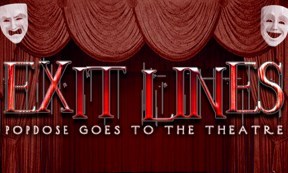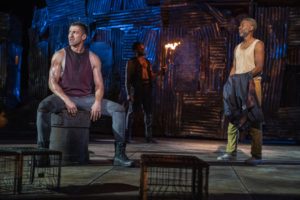 Last chance to see Coriolanus, which Shakespeare in the Park hasn’t staged since 1979. What took it so long? True, it doesn’t have the quotable lines, or the poetry, of other tragedies. But neither does Timon of Athens, my first Delacorte experience, in 1996, and that doesn’t even have a proper ending. Like Titus Andronicus it gets its hands dirty, and isn’t known as a crowdpleaser, but that was last seen outdoors in 1989. Whatever the reasons, this superlative production makes a strong case for more frequent revivals.
Last chance to see Coriolanus, which Shakespeare in the Park hasn’t staged since 1979. What took it so long? True, it doesn’t have the quotable lines, or the poetry, of other tragedies. But neither does Timon of Athens, my first Delacorte experience, in 1996, and that doesn’t even have a proper ending. Like Titus Andronicus it gets its hands dirty, and isn’t known as a crowdpleaser, but that was last seen outdoors in 1989. Whatever the reasons, this superlative production makes a strong case for more frequent revivals.
Coriolanus is very much a piece for our populist moment, staged without the Trumpian histrionics that catapulted Julius Caesar to the front pages two seasons ago. We’re far enough along the present situation to draw the parallels for ourselves. This is the story of a warrior without a war who is reluctantly drawn into politics, a more hazardous battle zone as it transpires. After skirmishing with the Volscians general Cauis Martius returns, injured but unbowed, to Rome, whereupon he is given the name “Coriolanus,” an honorific for those who have successfully beaten back challenges to the government. But the discontent is largely with the state’s borders; the plebeians are hungry, and dismissive of Coriolanus, who is equally contemptuous of them. This isn’t an attitude calculated to win many friends, but egged on by his mother Voluminia he runs for consul, and seems to be gaining the people’s trust when a stab in the back from his more calculating rivals forces him to change course. Banished from Rome he returns to war–this time fighting for the Volscians, a crusade that Volumnia and his wife, Virgilia, attempt to dissuade him from. The play ends as it began, in blood.
 I saw Troilus and Cressida twice before I felt I “got it,” and that was at a Delacorte staging in 2016. That Daniel Sullivan was again directing Coriolanus, another Shakespeare pegged as difficult, gave me hope, and he did not disappoint. It’s a straightforward yet actionful rendering, busy without being overwhelming, with few tricks or gimmicks to oblige our interest. (The first-rate fight sequences are the work of Steve Rankin.) He trusts that the politics, the betrayals, and the reversals are fascinating in and of themselves, the correct choice. The staging serves the text, quite strikingly; Beowulf Boritt’s junkyard set is comment enough on the pitfalls of war, with nooks and crannies for Japhy Weideman to illuminate with an eye toward compelling angles and colors. Fresh from Hadestown Jessica Paz has contributed an industrial soundscape highlighted by composer Dan Moses Schreier’s ominous, booming score. The best no-fuss contribution may come from costume designer Kate Voyce, whose off-the-rack Roman helps center the play in a no man’s land of past and present.
I saw Troilus and Cressida twice before I felt I “got it,” and that was at a Delacorte staging in 2016. That Daniel Sullivan was again directing Coriolanus, another Shakespeare pegged as difficult, gave me hope, and he did not disappoint. It’s a straightforward yet actionful rendering, busy without being overwhelming, with few tricks or gimmicks to oblige our interest. (The first-rate fight sequences are the work of Steve Rankin.) He trusts that the politics, the betrayals, and the reversals are fascinating in and of themselves, the correct choice. The staging serves the text, quite strikingly; Beowulf Boritt’s junkyard set is comment enough on the pitfalls of war, with nooks and crannies for Japhy Weideman to illuminate with an eye toward compelling angles and colors. Fresh from Hadestown Jessica Paz has contributed an industrial soundscape highlighted by composer Dan Moses Schreier’s ominous, booming score. The best no-fuss contribution may come from costume designer Kate Voyce, whose off-the-rack Roman helps center the play in a no man’s land of past and present.
There are no boldface names in this Coriolanus, simply veterans giving their considerable all as well. Mention must be made of Jonathan Hadary and Enid Graham, who are forthright and quite funny as the tribunes who are perpetual thorns in Coriolanus’ side, and the touching Virgilia of Nneka Okafor. Coriolanus’ fellow patrician Menenius (Teagle F. Bougere), more of a glad-hander, is a counterpoint to his inflexibility. Motherly love, for better and for worse, is pointedly conveyed by the great Kate Burton, a star in the Shakespearean realm.
For all that, however, you can’t have a Coriolanus without a Coriolanus who can play all the colors of the character. The Delacorte spotlit an ascendant Morgan Freeman forty years ago, and more recently there was Ralph Fiennes in a “contemporary” film version in 2011. I doubt anyone will play it with the zeal and zest that Jonathan Cake has brought to it this summer. He’s a piece of work, this Coriolanus, stubborn, prideful, heroic, fallibly authentic, loving, and a little stupid, the architect of his own downfall. The actor, a familiar face from plays and TV who more than deserves whatever boost his predecessor in the Park got from the part, is magnificent in a full-throttle performance. It was damp and chilly the night I saw Coriolanus but what I mostly felt was the fire of his conviction in the role. Let’s see more of Coriolanus, and Cake, in the future.





Comments